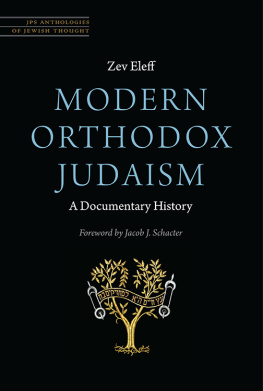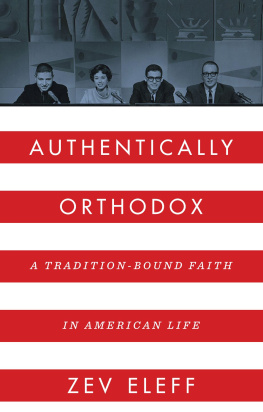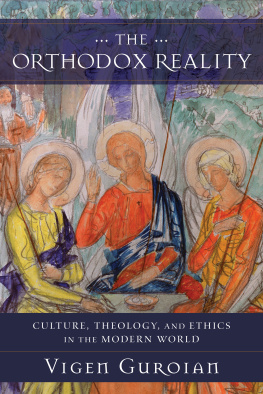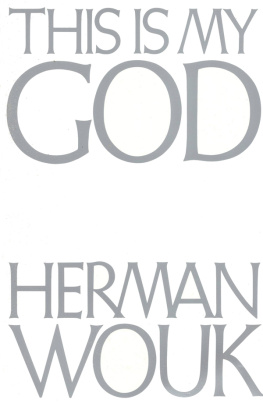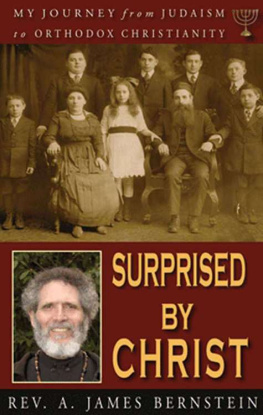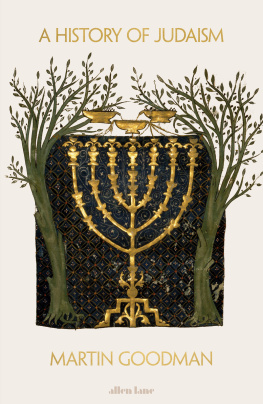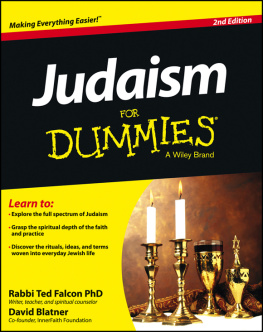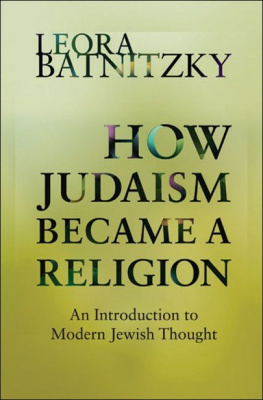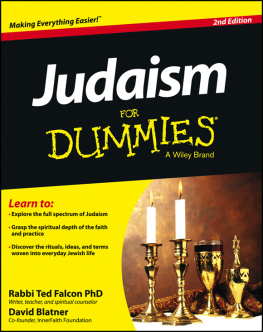Zev Eleff - Modern Orthodox Judaism: A Documentary History
Here you can read online Zev Eleff - Modern Orthodox Judaism: A Documentary History full text of the book (entire story) in english for free. Download pdf and epub, get meaning, cover and reviews about this ebook. year: 2016, publisher: University of Nebraska Press, genre: Religion. Description of the work, (preface) as well as reviews are available. Best literature library LitArk.com created for fans of good reading and offers a wide selection of genres:
Romance novel
Science fiction
Adventure
Detective
Science
History
Home and family
Prose
Art
Politics
Computer
Non-fiction
Religion
Business
Children
Humor
Choose a favorite category and find really read worthwhile books. Enjoy immersion in the world of imagination, feel the emotions of the characters or learn something new for yourself, make an fascinating discovery.
Modern Orthodox Judaism: A Documentary History: summary, description and annotation
We offer to read an annotation, description, summary or preface (depends on what the author of the book "Modern Orthodox Judaism: A Documentary History" wrote himself). If you haven't found the necessary information about the book — write in the comments, we will try to find it.
Zev Eleff: author's other books
Who wrote Modern Orthodox Judaism: A Documentary History? Find out the surname, the name of the author of the book and a list of all author's works by series.
Modern Orthodox Judaism: A Documentary History — read online for free the complete book (whole text) full work
Below is the text of the book, divided by pages. System saving the place of the last page read, allows you to conveniently read the book "Modern Orthodox Judaism: A Documentary History" online for free, without having to search again every time where you left off. Put a bookmark, and you can go to the page where you finished reading at any time.
Font size:
Interval:
Bookmark:
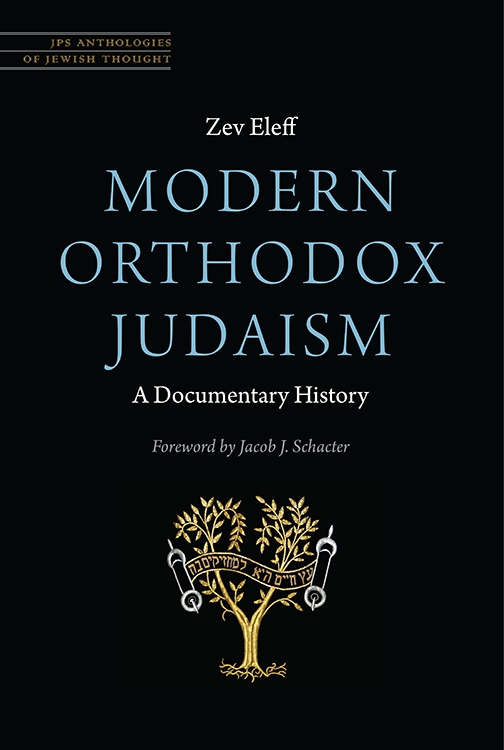
This is an original volume with enduring value.... Even in fifty to one hundred years, anyone studying Modern Orthodoxy will want to have access to the sources reproduced in this work.
Adam S. Ferziger, professor at Bar-Ilan University and author of Beyond Sectarianism: The Realignment of American Orthodox Judaism
A pathbreaking documentary history of Modern Orthodoxy in America. There is nothing like it. The documents are well chosen, and many will be neweven to scholars.
Jonathan D. Sarna, Joseph H. and Belle R. Braun Professor of American Jewish History at Brandeis University
EBSCO Publishing : eBook Collection (EBSCOhost) - printed on 4/26/2022 12:39 AM via
AN: 1241275 ; Zev Eleff.; Modern Orthodox Judaism: A Documentary History
Account: s6086892

The Jewish Publication Society expresses its gratitude for the generosity of the sponsors of this book.
In honor of our beloved parents and grandparents
Rabbi Aaron (zl) and Sora Landes
Rabbi Wilfred and Miriam (zl) Shuchat
Joshua Landes and Bryna Shuchat and Family

Zev Eleff
Foreword by Jacob J. Schacter

The Jewish Publication Society | Philadelphia
University of Nebraska Press | Lincoln
2016 by Zev Eleff
Cover image iStockphoto.com/peterspiro
Author photo courtesy of the author
Acknowledgments for the use of copyrighted material appear in , which constitutes an extension of the copyright page.
All rights reserved. Published by the University of Nebraska Press as a Jewish Publication Society book.
Library of Congress Control Number: 2016938772
The publisher does not have any control over and does not assume any responsibility for author or third-party websites or their content.
For Jack,
together with Meital,
my greatest contribution
to Modern Orthodoxy
by Jacob J. Schacter
Jacob J. Schacter
In the last decade of the eighteenth century, Rebecca Samuel, then living in Petersburg, Virginia, wrote a letter to her parents in Hamburg, Germany, in which she explained why she was moving from that city to Charleston, South Carolina. She informed them that although her husband, Hyman, had earned the respect of their Gentile neighbors as a very successful clockmaker and silversmith, and although one [i.e., a Jew] can live here peacefully, she and her family were leaving this place because of [the lack of] Yehudishkeit, or Jewishness, which is pushed aside here. She explained that the shohet, or ritual slaughterer, buys nonkosher meat, there is no Torah scroll in town, all Jewish-owned shops are open on the Sabbath, there are no educational opportunities available for her two children, and almost none of the worshippers on the High Holidays wore ritual prayer garments. You can believe me that I crave to see a synagogue to which I can go. The way we live now is no life at all.
The desire of Jews in America to be financially successful and respected by members of the community at large without sacrificing Jewish observance and communal cohesiveness has been a hallmark of Jewish life in this country from the very dawn of its existence. But those eighteenth-century Jews living in America were acutely aware that America was different than the countries from which they had emigrated and in which many of their family members and religious authorities still lived. In a letter written in 1785 to a rabbi in Amsterdam seeking guidance on a complex issue challenging their community, two lay leaders in Philadelphia noted that they were anxiously awaiting the rabbis reply because this matter touches the very essence of our faith, especially in this country where everyone does as he pleases [asher kol ish ha-yashar bi-enav yaaseh]. They wrote that in America, the Kahal has no authority over those who live in its midst, unlike the situation
Living in America, with its emphasis on freedom, democracy, and individualism, wasand continues to beboth a blessing and a challenge to perpetuating Jewish values and practice in this country. It is a blessing because Jews have been afforded an unprecedented opportunity to exercise their religion unhindered by external controls and constraints. At the same time it serves as a real challenge because in a world without any compulsory prerogatives, any choicesincluding those to define and reject Jewish practice and identityare possible and even celebrated. And the more traditional the values and practice, the greater the challenge to its perpetuation.
In this American world that celebrates personal autonomy and individual choice, Orthodoxy has found a place. For more than a hundred years it lived in the lives of dispersed individuals committed to it who acted alone, bereft of any institutional infrastructure or support, and then somewhere in the second half of the nineteenth century, it found expression in robust communities that were beginning to be founded and developed. True, Orthodoxys place in American Judaism was far from assured; even as late as the 1950s its decay was predicted and noted in respected circles. Orthodoxy has achieved a presence and prominence in America simply and literally unimaginable even fifty years ago.
But one cannot speak of one religious group identified as American Orthodoxy. Sociologists generally divide that group into Ultra-Orthodox (including Hasidic, Yeshivish, and even Heimish) and Modern Orthodox, each with its own set of assumptions, beliefs, and practices while sharing much in common. This book is devoted to exploring these categories in the Modern Orthodox community.
The fundamental point of departure of the Modern Orthodox perspective is generally described as combining a commitment to living a life shaped by Halakhah with an acknowledgment of the legitimacy, value, and, for some, even the necessity of non-exclusively Torah disciplines and cultures to enhance ones human personality and even ones spiritual religious persona. Of course, this combination certainly predates modern times. However, it has been brought more sharply into focus in the last decades as Orthodoxy has confronted the ever growing diminution of religious authority, the values and demands of feminism, the task of identifying the theological significance of the State of Israel, the claims of a larger and vocal liberal community, secularism, academic Jewish studies including biblical criticism, claims for the primacy of individual conscience, and cultural relativism. Inherited truths and assumptions have been challenged by a range of contemporary values, and the effort to retain a commitment to both has led sometimes to creativity and original thinking and sometimes to frustration, inconsistency, and even conflict.
Font size:
Interval:
Bookmark:
Similar books «Modern Orthodox Judaism: A Documentary History»
Look at similar books to Modern Orthodox Judaism: A Documentary History. We have selected literature similar in name and meaning in the hope of providing readers with more options to find new, interesting, not yet read works.
Discussion, reviews of the book Modern Orthodox Judaism: A Documentary History and just readers' own opinions. Leave your comments, write what you think about the work, its meaning or the main characters. Specify what exactly you liked and what you didn't like, and why you think so.

